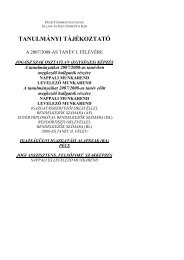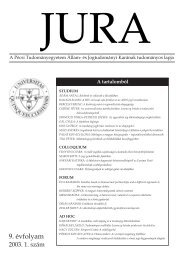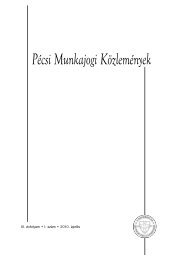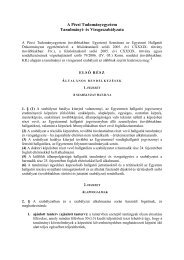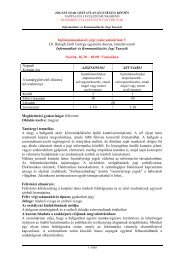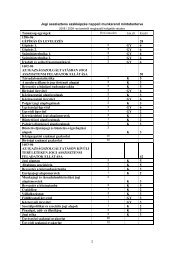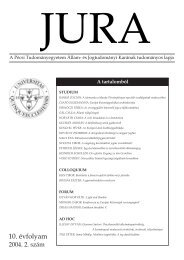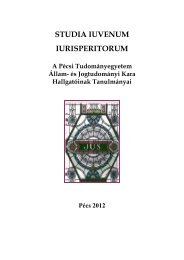2012. évi 2. szám - Jura - Pécsi Tudományegyetem
2012. évi 2. szám - Jura - Pécsi Tudományegyetem
2012. évi 2. szám - Jura - Pécsi Tudományegyetem
- TAGS
- jura
You also want an ePaper? Increase the reach of your titles
YUMPU automatically turns print PDFs into web optimized ePapers that Google loves.
222 Ulrich Karpen: Migration and Human Rights – Challenges and Chancesset out in the Charter of Fundamental Rights of theEuropean Union …, which shall have the same legalvalue as the Treaties”. The Charter covers more orless the same rights as the other legal instrumentswhich I referred to above. It is, however, a significantstep forward in quality, since the scope of the formatof the rights and their dogmatic structure representsthe progress of courts’, lawyers’ and academia’sinterpretation of Human Rights.As regional source of Human Rights, one mighttake into account the Nordic Union Code and theCharter for a New Europe of the Organization forSecurity and Cooperation in Europe (OSCE, 1990). Itis a result of the Helsinki Process ,which already in1975 by the participating states assured its respect forHuman Rights, the reunification of families a.s.o. Bythe way: OSCE’s Office for Democratic Institutionsand Human Rights (ODIHR) is located in Warsaw.Finally, there are the Fundamental Rights’ Codesin most member states’ constitutions and in FederatedSystems in subnational constitutions as well,including Constitutional or Supreme Courts to implementthe rights on the respective level.Fundamental rights of migrants or persons withmigration background have different functions: theymay be interpreted as defending rights, sharing rightsand participatory rights. Basically and from civilliberaltradition Human Rights are barriers to defendthe individual against illegitimate abridgmentof individual positions – like life, liberty, freedomof expression, property – by government, later onagainst intrusions in Human Rights without legitimationby a statute, a law as adopted by parliament.This status is one of the anchors of the rule of lawstate. In this sense the migrant may defend himselfagainst illegal deportation, detention, exploitation.He must have the right to stay in the country on humanitariangrounds, at least as long as it is decidedin a fair procedure, whether he may be granted theright of asylum or another secure status, a right tostay. This status (status negativus, man versus thestate) includes access to courts. The pictures fromLampedusa remind us of the importance of thatvery basic right.Nobody can live on rights. In fact, the rights of life,liberty, good health – the right to survive – generateentitlements to share state offerings in subsistence,food, housing, security, information, education –from the beginning of being in a country as a migrant.How can one survive in an unknown environmentwithout a chance to be taught the basics of the language?How can one survive without being granteda chance to find a paid job? Art. 8 of the EuropeanConvention of Human Rights concretizes a facetof that basic sharing right: “Everyone has the rightto respect for his private and family life, his homeand his correspondence.” These rights may be puttogether in the status positivus.Finally, a primordial instrument and even necessityfor facilitating integration of people with migrantbackground is participation in civic and political life,to grant migrants participatory rights (status activus).Basic liberties for all encompass a right to petition,to express oneself, to assemble, to demonstrate, tofound an association, to join a trade union or a politicalparty. Not only must a country grant access to thevoluntary civic sector, but – in the long run – to allowfor access to nationality: to become eligible to be ina condition to fullfil the requirements for naturalization,to enjoy – for that purpose – a secure status.Here we find until now in European member statesa diversity of regulations for the legal status to stayand finally for the acquisition of citizenship. Somecountries are more restrictive, some more liberal. Justas an example among others – without any evaluation– I present the situation in my country:—— a migrant crossing the border illegally startswith toleration of stay, which means temporaryprohibition of deportation;—— then he may receive a timely limited permissionof stay and he may work;—— after seven years he may be granted a permissionof establishment, i.e. to start a business;—— finally, after eight years, he may apply fornaturalization. The requirements are a languagetest, basic civic knowledge and the capacityindependently to finance his existence.The country changed some 20 years ago theprinciple of naturalization: from descendentprinciple (ius sanguinis) to territorial principle(ius soli), so that everybody with migrantbackground, who has been born on Germanterritory, has an easier chance to gain citizenshipthan before. The country is not in favourof dual or multiple nationality. Many countriesallow for dual or multiple nationality,othersnot.In the latter cases an application for citizenshiprequires the renunciation of all formernationalities. At the age of 18 years, when legalcapacity begins, a person who still has doublenationality has to decide and opt for one ofthese. There are exceptions: In hardship casesa factual integration is accepted, and of coursethere is a rather difficult, but rather frequentlyused asylum procedure on grounds of politicalpersecution. In Germany, as in most Europeancountries, the participatory rights are takenvery seriously. Participation at all levels, mobilisation,and finally representation are theking’s way to integration.JURA 2012/<strong>2.</strong>



